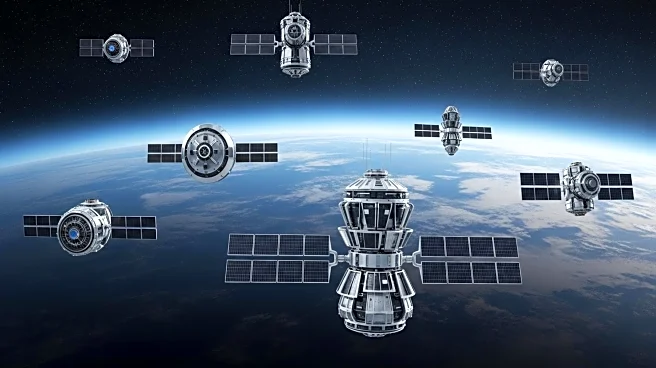What is the story about?
What's Happening?
SpaceX has launched 28 additional Starlink satellites into orbit from Cape Canaveral Space Force Station, Florida. The launch occurred at 4:39 a.m. EDT on September 25, 2025, using a Falcon 9 rocket. The first stage of the rocket, which has been used 22 times, successfully landed on the droneship 'A Shortfall of Gravitas' in the Atlantic Ocean. This mission is part of SpaceX's ongoing efforts to expand its Starlink satellite internet constellation, which now includes over 8,400 active satellites, making it the largest satellite network ever assembled.
Why It's Important?
The expansion of the Starlink network is crucial for providing global internet coverage, particularly in remote and underserved areas. This development has significant implications for global connectivity, offering high-speed internet access where traditional infrastructure is unavailable. The successful reuse of the Falcon 9 rocket's first stage demonstrates SpaceX's advancements in reusable rocket technology, which reduces launch costs and increases the frequency of missions. However, the growing number of satellites raises concerns about space debris and the impact on astronomical observations, prompting discussions about the need for regulatory measures.
What's Next?
SpaceX plans to continue its rapid launch schedule, with the potential to exceed 130 launches by the end of 2025. The company is also preparing to deploy larger Starlink V2 satellites using its new Starship rocket, which could further enhance network capacity and introduce new services, such as direct-to-cell connectivity. Meanwhile, competitors like Amazon's Project Kuiper and OneWeb are racing to establish their own satellite internet networks, intensifying the global competition in space-based internet services.
Beyond the Headlines
The rapid expansion of satellite constellations like Starlink poses ethical and environmental challenges, including the risk of increased space debris and the impact on the night sky. These issues highlight the need for international cooperation and regulation to ensure the sustainable use of space. Additionally, the strategic importance of satellite internet for military and emergency communications underscores its geopolitical significance, as countries seek to secure their own networks to avoid reliance on foreign systems.















